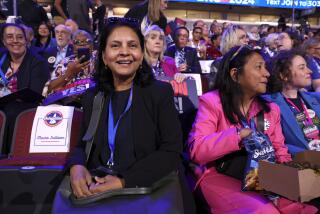Muslims Meet to Discuss How to Gain Public Office in U.S. : Politics: Time has come to shed negative stereotypes, learn the American system and start building a base for candidates, delegates to conference are told.
- Share via
BUENA PARK — Nisar Hai thought he had a chance at winning a seat in the U.S. House of Representatives in an election a year ago. That was until an article about Islam in a local newspaper emphasized that the 53-year-old Alhambra man was head administrator of a San Gabriel mosque.
“Muslims don’t have a good image in this country,” said Hai, who lost in a primary but received about 34% of the vote. “Associating me as a Muslim did the damage.”
Hai, president of the United Muslims of America, spoke of his experiences at the American Muslims Conference at the Buena Park Hotel and Convention Center, where about 700 people gathered for discussion on how Muslims can shed negative stereotypes, learn the American political system and win political office.
Guests at the event, sponsored by the UMA’s Southern California chapter, also discussed worldwide Muslim issues. The goal of the conference, however, was to “make the Muslim community aware of the American system and create a base for potential (political) candidates in the future,” said Riaz Khan, the chapter’s president.
According to the Islamic Center of Southern California, there are about 6 million Muslims in this country. Conference organizers said that about 800,000 live in Southern California. Yet there are few foreign- or U.S.-born Muslims in positions of power, they said.
Charles Mustafa Bilal, who as mayor of Kountze, Tex., is the country’s only Muslim mayor, spoke about strategies for getting into politics.
“The time is right for American Muslims to get involved in political office,” said Bilal, who became a Muslim after watching and listening to boxer Muhammed Ali on television in the 1970s. “If southeast Texas can allow a Muslim to become mayor, why not California?”
Bilal advised that Muslim men and women become involved in school boards and city councils, then move up the political ladder. Others advised volunteering for other candidates and becoming campaign managers.
Several Muslims said they believe that many Americans see them as terrorists or crazed religious fundamentalists. Those perceptions deter some--especially first-generation, foreign-born Muslims--from seeking the public spotlight.
Most Muslims in the United States arrived after World War II, said former Illinois congressman Paul Findley, who has written on Israel’s influence on the U.S. government. Many have been too timid, too involved in adjusting to a different culture or too engaged in business to get into politics, he said. Some believe that politics is simply a dirty business.
Young, American-born Muslims, however, called for young adults to jump into the political arena. “Definitely, we can have an impact on politics,” said Riaz Surti, past president of the Muslim Students Union at USC.
“The Koran teaches us morality in society. We have an opportunity to let others know about our values,” Surti added.
Khan said Muslims have joined the Democratic and Republican parties, though most interviewed Sunday said they hold conservative positions. “Muslims tend to have values that embrace the family. We are pro-life, and the like,” Khan said.
What about women in politics? Khan’s wife, Yasmin, said: “If we, as women, are educated, we should be able to contribute as well.”
“Muslim women have more of a role as a mother raising children,” Hai said. “But I would support a woman if she came forward.”
Thaniat Rizvi of Torrance agreed that women should be able to lead.
“In America, they (men) realize they have to let us do it,” said Rizvi, a homemaker. “Women have rights too.”
More to Read
Get the L.A. Times Politics newsletter
Deeply reported insights into legislation, politics and policy from Sacramento, Washington and beyond. In your inbox twice per week.
You may occasionally receive promotional content from the Los Angeles Times.









